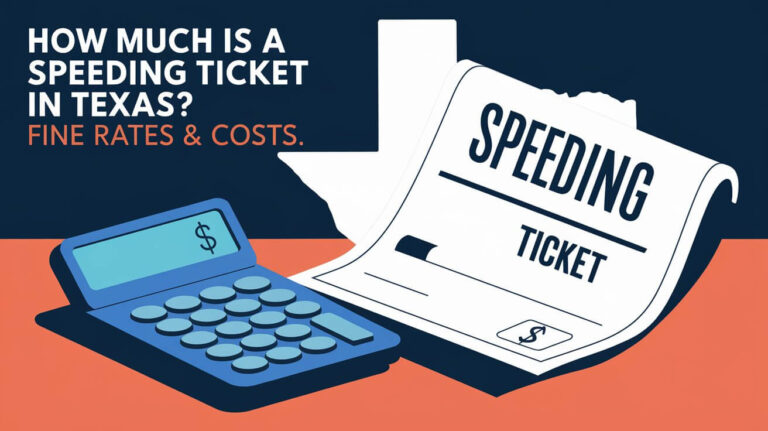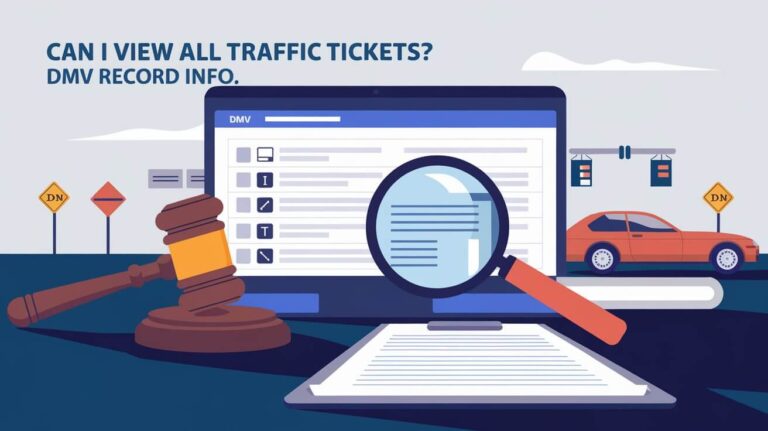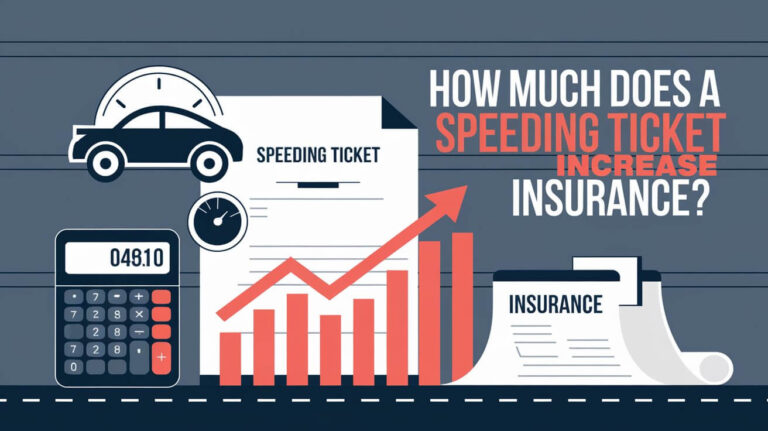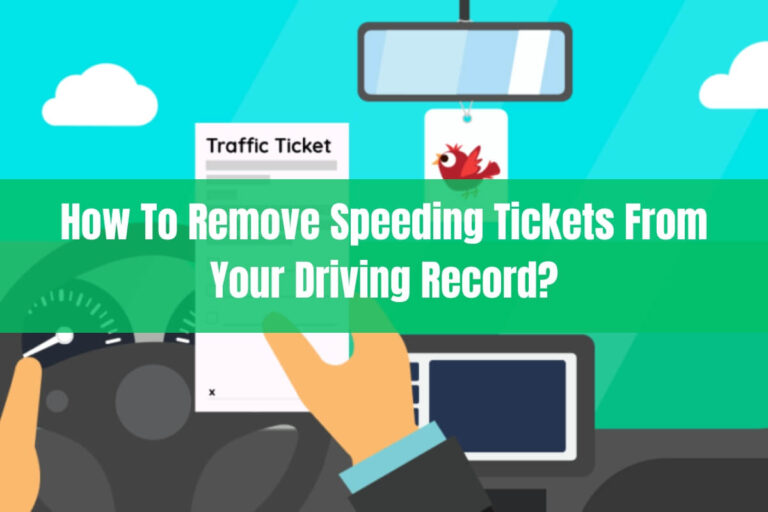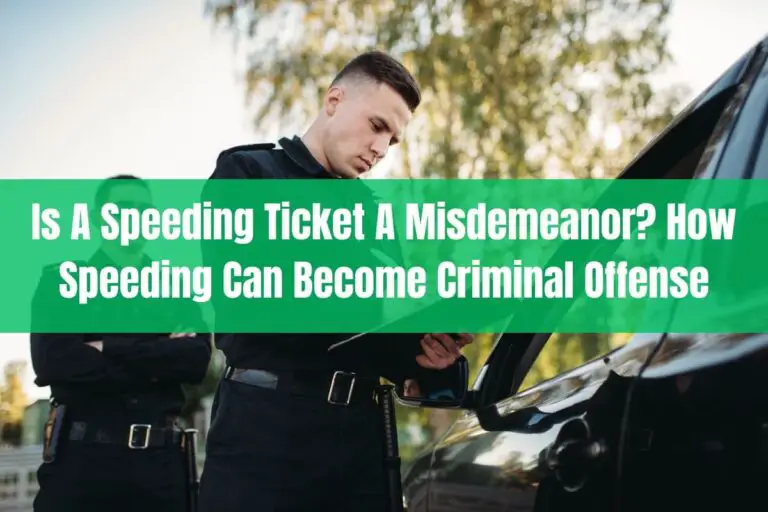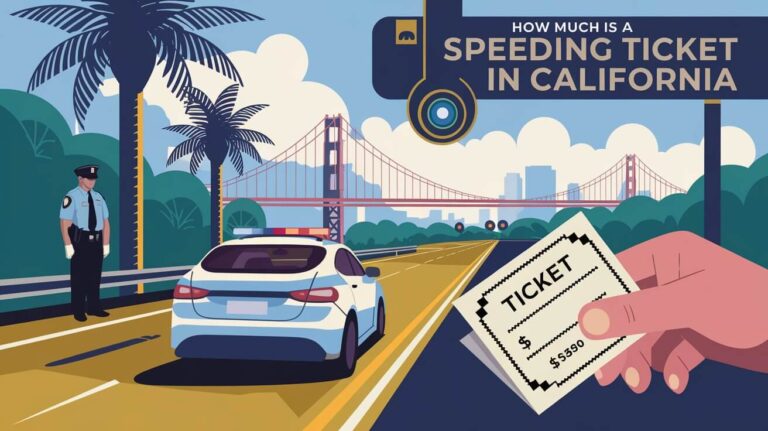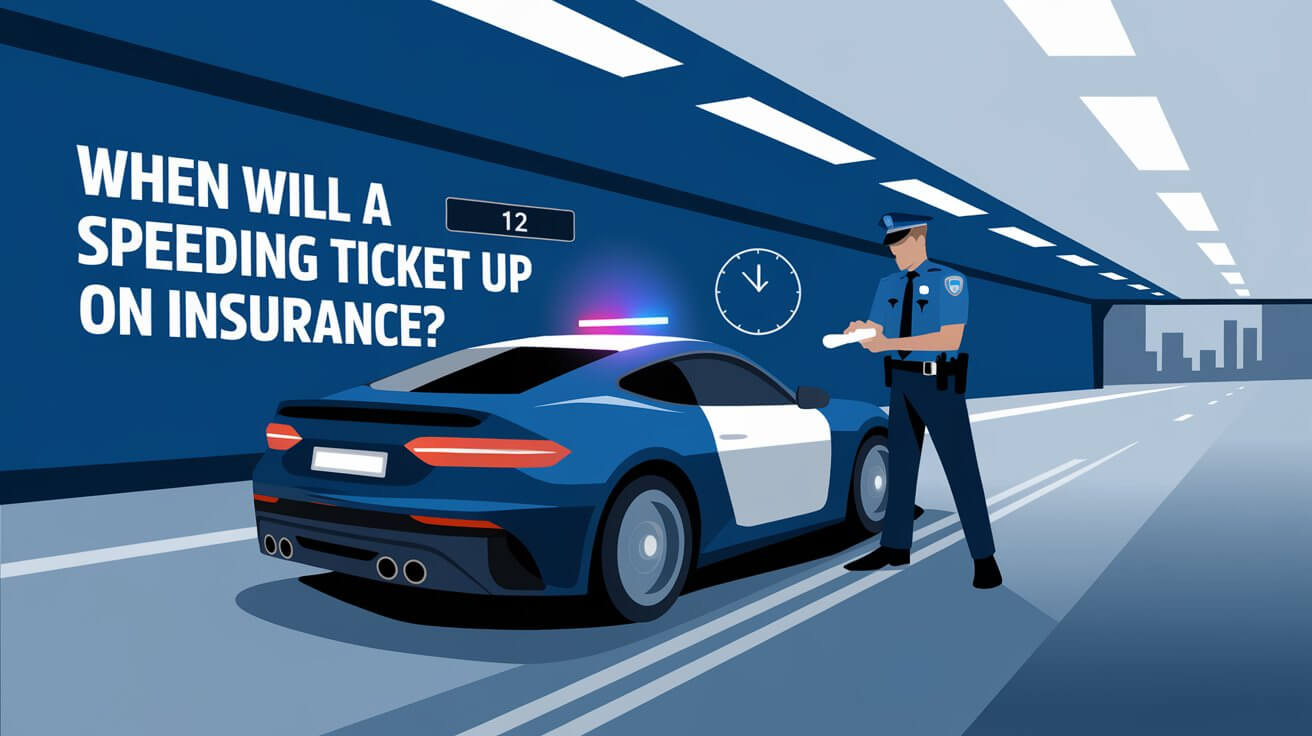
Getting a speeding ticket can be really stressful, mainly because of how it might affect your insurance rates. While a speeding ticket might not always raise your insurance, it really depends on the situation. Generally, a speeding ticket can make your car insurance go up by about 25% when it’s time to renew.
Not every speeding ticket will lead to higher insurance costs. Things like your driving history and where you got the ticket can change how much your insurance goes up. Some places might not raise your rates for small speeding tickets. The severity of the ticket and how often you get one can also play a big role in your insurance costs.
Timeline From Citation to Insurance Impact
The time it takes for a speeding ticket to affect your insurance can change a lot. Knowing when a ticket will show up on your insurance is key. Insurance companies check your driving record every 6-12 months. If they find a speeding ticket, your premiums might go up.
How long it takes depends on where you live and your insurance company. States have different rules for reporting tickets, and insurance companies process them at different speeds. For example, in Virginia, speeding tickets stay on your record for five years.
Standard Processing Periods
Insurance companies usually take a few weeks to several months to process tickets. It’s important to check your driving record and insurance policy. This way, you’ll know how a speeding ticket might change your premiums.
State-by-State Variations
State laws greatly affect how long it takes for a ticket to impact your insurance. In Vermont, the increase in insurance rates after a ticket is small. But in Michigan, the increase is bigger.
DMV Reporting Schedules
When the DMV reports tickets to insurance companies also matters. In some places, they report right away. In others, it takes months. Knowing these schedules helps you guess when a ticket will affect your insurance.
To lessen the impact of a speeding ticket on your insurance, understanding the timeline is key. Knowing what to expect and when can help you reduce the effects on your premiums.
| State | Speeding Ticket Duration on Record | Average Insurance Rate Increase |
|---|---|---|
| Virginia | 5 years | 25% |
| Michigan | 3-5 years | 30% |
| Vermont | 3 years | 10% |
First Steps After Receiving a Speeding Citation
Receiving a speeding ticket can be a stressful experience. But, taking the right steps can help keep your insurance rates down. Bankrate says drivers should act fast to protect their rates. First, understand the ticket and its possible effects, like a 25% increase in insurance costs.
Then, check your insurance policy and talk to your company. They might look at your driving history for 3 to 5 years. If you get multiple tickets quickly, it could raise your rates. The speed you were going, if it’s your first ticket, and where it happened also matter.
Some important things to do after getting a speeding ticket include:
- Understanding the citation and its possible effects
- Reviewing your insurance policy and contacting your insurance company
- Considering the impact of multiple violations on your insurance rates
- Exploring options to reduce the charges, such as taking a defensive driving course
| Violation Type | Average Increase in Insurance Premiums |
|---|---|
| First speeding ticket | 39% |
| Second speeding ticket | 43% |
Taking these steps and understanding the ticket’s effects, drivers can manage the situation. This helps keep insurance rates lower.
Insurance Premium Calculation Changes
A speeding ticket can lead to higher insurance premiums.This is based on how serious the ticket is, your driving history, and other things. Knowing these factors can help you guess how much your insurance might go up.
Insurance companies look at how you drive and your attitude towards safety laws. The more serious the ticket, the bigger the impact on your insurance. Getting several tickets in a row can really raise your rates and might even mean your insurance won’t renew.
Things that affect your car insurance include the car’s make and model, how much it costs to fix, and how safe it is. They also look at how far you drive each day, your driving history, and if you’ve made claims before.
Key Factors Influencing Insurance Premiums
- Driving history, including speeding tickets and accidents
- Location, with urban areas often having higher premiums than rural areas
- Vehicle type, with sports cars and luxury vehicles typically having higher premiums
- Claims history, with frequent claims leading to higher premiums
Insurance companies use math to guess how likely you are to make a claim. They balance what they collect in premiums with what they might have to pay out. The effect of a speeding ticket on your insurance usually shows up when it’s time to renew.
Many things can affect how much your insurance goes up after a speeding ticket. These include how serious the ticket was, your driving record, the insurance company’s rules, and state laws. By understanding these, you can guess how much your insurance might go up and take steps to lessen the impact of a speeding ticket.
State Laws and Insurance Company Policies
State laws and insurance policies greatly affect speeding tickets and insurance rates. Knowing these rules can help drivers understand how insurance rates work. For example, some states don’t let insurance companies raise rates for minor offenses. Others do.
Insurance companies also have their own rules about speeding tickets. Some are more lenient than others. Getting discounts for things like bundling home and auto coverage can help lower rates. Here are some important points:
- Defensive driving courses might keep a speeding ticket off your record. This could prevent higher car insurance costs.
- Usage-based insurance programs like Driveology® from Farm Bureau track your driving. You might get lower rates, even with a speeding ticket.
- On average, a speeding ticket can raise car insurance rates by 25%. This means a $550 increase every year.
Knowing the laws and policies in your area is key. It helps you make smart choices about your insurance. By understanding these factors, you can lessen the effect of a speeding ticket on your rates.
| State | Insurance Rate Increase | Time to Remove Ticket from Record |
|---|---|---|
| California | Up to 50% | 3 years |
| New Jersey | Up to 50% | 5 years |
| Colorado | Up to 20% | 7 years |
Actual Duration of Premium Increases
Premium increases after a speeding ticket can last a long time. This depends on the insurance company and how serious the ticket was. Bankrate says these increases can go on for years.
In Virginia, for example, a speeding ticket can raise your premium by about 20%. This means a 40-year-old male might see his premium jump from $1,920 to $2,303. A 40-year-old female might see her premium go from $1,865 to $2,237. Many things can affect how long these increases last, like the car’s make and model, and how much you drive.
Short-Term Effects
In the short term, premium increases can be big. For instance, Geico’s premium might go up by 8% after a speeding ticket. This means it could go from $1,573 to $1,705 a year. Virginia Farm Bureau’s premium might increase by 23%, from $1,219 to $1,500.
Long-Term Consequences
In the long term, premium increases can be even more serious. They can lead to higher premiums for a long time. Knowing how long it takes for premiums to go back down can help drivers prepare for the effects of a speeding ticket. Here’s a table showing how premiums can change for different Virginia insurance companies after a speeding ticket:
| Insurance Carrier | Original Premium | Premium after Speeding Ticket | Percentage Increase |
|---|---|---|---|
| Geico | $1,573 | $1,705 | 8% |
| Virginia Farm Bureau | $1,219 | $1,500 | 23% |
| Nationwide | $1,329 | $1,597 | 20% |
| USAA | $1,361 | $1,660 | 22% |
| Travelers | $1,098 | $1,479 | 35% |
Recovery Timeline
The time it takes for premiums to go back down can vary. It depends on the insurance company and the severity of the ticket. Generally, premium increases can last for years. Knowing what affects this timeline can help drivers prepare for the consequences of a speeding ticket.
When Will A Speeding Ticket Show Up On Insurance Records
Drivers often wonder when a speeding ticket will appear on their insurance records. The time frame varies by state and insurance company. Usually, it takes 30-60 days after the ticket for it to be reported.
Knowing when a speeding ticket will show up can help drivers prepare. A speeding ticket can raise car insurance rates for three years. Several factors affect how much rates will go up, including the insurance policy and the location of the ticket.
Here are some important points to remember: * A speeding ticket stays on your record for three years. * The number of points added to your record depends on the state. * Taking defensive driving courses can help keep tickets off your record. * Insurance companies look at your driving history and the severity of the violation when deciding on coverage.
| State | Speeding Ticket Fine | Duration on Record |
|---|---|---|
| Idaho | $90-$155 | 3 years |
| Michigan | Varying | 3 years |
| California | $30-$300 | 3 years |
Car insurance rates usually go up by about 25% after a speeding ticket. It’s key to know the laws in your state and how they affect your insurance.
Premium Protection Strategies
Keeping your insurance premiums low is key. There are many ways to do this. Bankrate says taking a defensive driving course can lower your rates and make you a better driver. Also, having a clean driving record is vital. It helps keep your rates down, even after a speeding ticket.
A clean driving record means no accidents or tickets. If you get a speeding ticket, know how it will change your rates. For instance, a small ticket might raise your rates by 7-11%. But a bigger ticket could increase them by 25-35%.
Here are some ways to protect your premiums: * Take a defensive driving course to improve your driving skills and reduce premiums * Maintain a clean driving record to minimize the impact of a speeding ticket * Shop around for insurance quotes to find the best rates * Bundle policies to reduce premiums * Take advantage of discounts, such as good student discounts or low-mileage discounts
Using these strategies, you can keep your premiums low. Remember, a clean driving record and defensive driving courses are big helps. They can lower your insurance rates and keep your premiums affordable.
| Violation | Average Rate Increase |
|---|---|
| Minor speeding ticket | 7-11% |
| More serious speeding ticket | 25-35% |
| Hit-and-run violation | 82.2% |
Insurance Company Assessment Methods
Insurance companies have different ways to figure out how much to charge for premiums. They look at how risky a driver is. Stacker says they use points and risk levels to judge drivers.
Point System Overview
The point system gives points to drivers based on their past driving. For instance, getting a speeding ticket might add points to your record. The more points you have, the more you’ll pay for insurance. Here are some common point values for different infractions:
- Speeding ticket: 2-3 points
- Reckless driving: 4-5 points
- Accident: 3-4 points
Risk Category Changes
Insurance companies might also change how they see a driver based on their history. This can change how much you pay for insurance. For example, if you’ve been in many accidents, you might be seen as a high-risk driver and pay more.
Knowing how these methods work can help drivers understand how a speeding ticket might affect their rates. By understanding points and risk levels, drivers can try to keep their rates low.
Clean Record Restoration Options
It’s possible to restore a clean driving record. There are many ways drivers can do this. Bankrate says taking a defensive driving course or getting legal advice can lower premiums and improve driving skills.
Here are some ways to restore your record:
- Taking a defensive driving course to reduce points on your record and show you’re committed to safe driving.
- Getting legal advice to reduce or dismiss charges, keeping your record clean.
- Attending traffic school or a driver improvement program to better your driving and lower premiums.
Keeping a clean driving record can really help with auto insurance rates. Safe drivers are seen as lower risks, leading to lower premiums. By trying these restoration options, drivers can work towards a clean record and lower insurance costs.
| Restoration Option | Benefits |
|---|---|
| Defensive Driving Course | Reduced points on record, improved driving skills, lower premiums |
| Legal Advice | Reduced or dismissed charges, maintained clean record |
| Traffic School or Driver Improvement Program | Improved driving skills, reduced premiums, clean record |
Different Insurance Carrier Approaches
Insurance companies handle speeding tickets and rates in different ways. Knowing these differences helps drivers pick the right insurance. In the U.S., rates can change by 6% to 33% after a speeding ticket.
Some insurers are more lenient, while others are stricter. For example, going to court, taking a defensive driving course, or using telematics can lower rates. Drivers can also adjust their policies to save money.
It’s important to compare insurance carriers to find the best one. By knowing how insurers deal with speeding tickets, drivers can save on premiums. Some insurers offer more discounts for safe drivers, while others penalize those with many tickets.
When looking at insurance carriers, consider these points:
- How much rates increase after a speeding ticket
- Discounts for safe drivers
- Penalties for drivers with many tickets
- Ways to lower rates, like defensive driving courses
Looking at these factors, drivers can choose the best insurance for their needs.
Driver Rights and Responsibilities
As a driver, knowing your rights and responsibilities is key. This is true when dealing with speeding tickets and insurance rates. Stacker says drivers have rights like contesting a citation and the duty to keep a clean driving record.
Grasping your rights and duties can guide you through the insurance world. For instance, if you get a speeding ticket, you can fight it. This might lower or clear the charges. Also, keeping a clean driving record can cut your premiums and boost your driving skills.
Some important parts of driver rights and duties include:
- Contesting a citation: You have the right to contest a speeding ticket, which can help reduce or dismiss the charges.
- Maintaining a clean driving record: You have the responsibility to maintain a clean driving record, which can help reduce premiums and improve driving skills.
- Understanding insurance rates: You have the right to understand how your insurance rates are calculated and what factors affect them.
Understanding your rights and responsibilities as a driver helps you make informed decisions. This helps you manage your driving record and insurance rates better.
Conclusion
A speeding ticket can significantly increase your car insurance rates. But, there are ways to lessen the blow. Knowing how a ticket affects your insurance and understanding state laws and insurance policies can help.
There are many steps you can take. You could take a defensive driving course, fight the ticket in court, or look for better insurance rates. These actions can help you recover from the financial hit of a speeding ticket.
Being proactive is key. It helps you deal with the complex world of insurance rates. This way, one speeding ticket won’t ruin your coverage or your budget for a long time.
Act fast and use all the options you have to reduce the impact of a speeding ticket on your insurance. With the right steps, you can keep your driving record clean, protect your money, and enjoy driving safely and responsibly.
Frequent Questions
When will a speeding ticket show up on my insurance?
A speeding ticket usually shows up on your insurance within 30-60 days. This is after the DMV reports it to your insurance company.
How does the timeline from citation to insurance impact work?
The time it takes for a speeding ticket to affect your insurance varies. It depends on the state and your insurance company. Usually, insurance companies check your driving record every 6-12 months.
If they find a speeding ticket, your premiums might go up. But, different states report tickets at different times. Insurance companies also process information at their own pace.
What are the first steps I should take after receiving a speeding citation?
First, understand the citation and its possible outcomes. Then, review your insurance policy. Contact your insurance company to talk about how the ticket might affect you.
Consider taking a defensive driving course. Or, get legal advice to lessen the ticket’s impact.
How do insurance premium calculations change after a speeding ticket?
Calculating insurance premiums is complex. When you get a speeding ticket, your premiums might go up. This depends on the ticket’s severity, your driving history, and other factors.
How do state laws and insurance company policies affect speeding tickets and insurance rates?
State laws and insurance policies greatly influence how speeding tickets affect your rates. Some states limit how much rates can increase for minor offenses. Others let insurance companies consider all violations.
Insurance companies also have their own rules about speeding tickets. These rules can affect your rates.
How long do the effects of a speeding ticket on my insurance premiums last?
The length of time your premiums increase can vary. It depends on the insurance company and the ticket’s severity. In the short term, premiums might rise significantly.
This increase can last months or even years. In the long term, the increase can be more lasting, leading to higher premiums for a longer time.
What strategies can I use to protect my insurance premiums?
To keep your premiums low, maintain a clean driving record. Avoid accidents and citations. Taking a defensive driving course can also help.
Shop around for insurance quotes. Consider bundling policies. And, take advantage of available discounts.
How do insurance companies assess the impact of a speeding ticket?
Insurance companies use complex methods to assess premiums. They use point systems and risk category changes. The point system assigns points based on your driving history.
More points mean higher premiums. Risk category changes can also impact your premiums. Insurance companies may reclassify drivers based on their history and other factors.
How can I restore a clean driving record after a speeding ticket?
You can restore a clean driving record. Taking a defensive driving course is a good start. It can reduce premiums and improve your driving skills.
Seek legal advice to reduce or dismiss the charges. Attend traffic school or participate in a driver improvement program. These steps can help.
How do different insurance carriers handle speeding tickets and insurance rates?
Insurance carriers have different policies for speeding tickets and rates. Major providers might be more lenient. Regional carriers might be stricter.
Some carriers offer more discounts for clean records. Others may have harsher penalties for multiple violations.
What are my rights and responsibilities as a driver when it comes to speeding tickets and insurance rates?
As a driver, you have the right to contest a citation. This can help reduce or dismiss charges. You also have the responsibility to keep a clean driving record.
This can help lower premiums and improve your driving skills.

